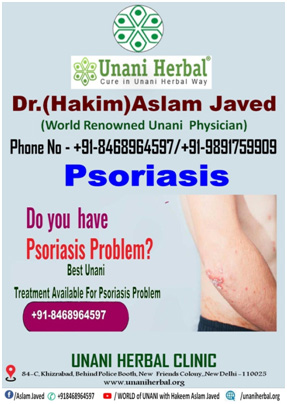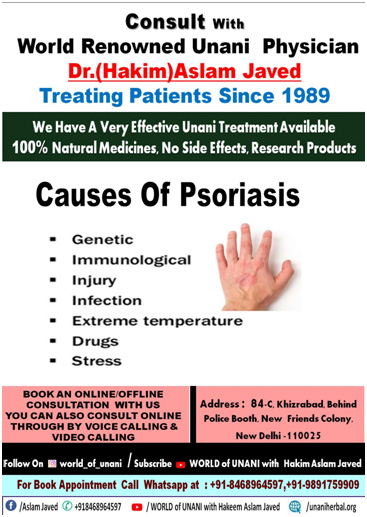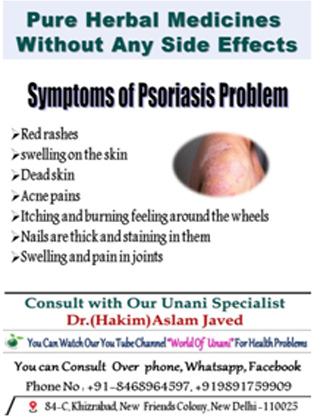Issue :- 93

Psoriasis
Psoriasis is a skin disease that causes red, itchy scaly patches, most commonly on the knees, elbows, trunk and scalp. Psoriasis is a common, long-term (chronic) disease. Psoriasis is a immune system problem that causes the skin to regenerate at faster than normal rates. Psoriasis patches can range from a few spots of dandruff-like scaling to major eruptions that cover large areas. The most commonly affected areas are the lower back, elbows, knees, legs, soles of the feet, scalp, face and palms. Most types of psoriasis go through cycles, flaring for a few weeks or months.

There are several types of psoriasis, including:
1. Plaque psoriasis
The most common form, plaque psoriasis causes dry, raised, red skin patches (lesions) covered with silvery scales. The plaques might be itchy or tender, and there may be few or many. They usually appear on elbows, knees, lower back and scalp.
2. Nail psoriasis
Psoriasis can affect fingernails and toenails, causing pitting, abnormal nail growth and discoloration. Severe cases may cause the nail to crumble.
3. Guttate psoriasis
This type primarily affects young adults and children. It's usually triggered by a bacterial infection such as strep throat. It's marked by small, drop-shaped, scaling lesions on the trunk, arms or legs.
4. Inverse psoriasis
This mainly affects the skin folds of the groin, buttocks and breasts. Inverse psoriasis causes smooth patches of red skin that worsen with friction and sweating. Fungal infections may trigger this type of psoriasis.
5. Pustular psoriasis
This rare form of psoriasis causes clearly defined pus-filled lesions that occur in widespread patches (generalized pustular psoriasis) or in smaller areas on the palms of the hands or the soles of the feet.
6. Erythrodermic psoriasis
The least common type of psoriasis, erythrodermic psoriasis can cover your entire body with a red, peeling rash that can itch or burn intensely.
7. Psoriatic arthritis
Psoriatic arthritis causes swollen, painful joints that are typical of arthritis. Symptoms range from mild to severe and psoriatic arthritis can affect any joint. It can cause stiffness and progressive joint damage that in the most serious cases may lead to permanent joint damage.
Causes of Psoriasis
1. Immune system
Psoriasis is an autoimmune condition. Autoimmune conditions are the result of the body attacking itself. In the case of psoriasis, white blood cells known as T cells mistakenly attack the skin cells.
2. Genetics
Some people inherit genes that make them more likely to develop psoriasis. If you have an immediate family member with the skin condition, your risk for developing psoriasis is higher.
3. Injury
4. Drugs
5. Stress

Symptoms
Psoriasis signs and symptoms can vary from person to person. Common signs and symptoms include:
- Red patches of skin covered with thick, silvery scales
- Small scaling spots (commonly seen in children)
- Dry, cracked skin that may bleed or itch
- Itching, burning or soreness
- Thickened, pitted or ridged nails
- Swollen and stiff joints

Risk factors
Anyone can develop psoriasis. About a third of instances begin in the pediatric years. These factors can increase your risk:
Family history
The condition runs in families. Having one parent with psoriasis increases your risk of getting the disease, and having two parents with psoriasis increases your risk even more.
Stress
Because stress can impact your immune system, high stress levels may increase your risk of psoriasis.
Smoking
Smoking tobacco not only increases your risk of psoriasis but also may increase the severity of the disease. Smoking may also play a role in the initial development of the disease.
Diet recommendations for people with psoriasis
Food can’t cure or even treat psoriasis, but eating better might reduce your symptoms. These five lifestyle changes may help ease symptoms of psoriasis and reduce flare-ups:
1. Lose weight
If you’re overweight, losing weight may reduce the condition’s severity. Losing weight may also make treatments more effective, losing weight is still good for your overall health.
2. Eat a heart-healthy diet
Reduce your intake of saturated fats. These are found in animal products like meats and dairy. Increase your intake of lean proteins that contain omega-3 fatty acids, such as salmon, sardines, and shrimp. Plant sources of omega-3s include walnuts, flax seeds, and soybeans.
Stress
Because stress can impact your immune system, high stress levels may increase your risk of psoriasis.
3. Avoid trigger foods
Psoriasis causes inflammation. Certain foods cause inflammation too. Avoiding those foods might improve symptoms. These foods include:
- red meat
- refined sugar
- processed foods
- dairy products
4. Drink less alcohol
5. Consider taking vitamins

Nomination form for 2020 Global Awards
https://www.unaniherbal.org/nomination-form.html
For Consultation click here
Copyright 2014 Unani Herbal
If you wish to cancel your subscription to this newsletter click here






